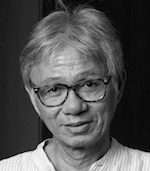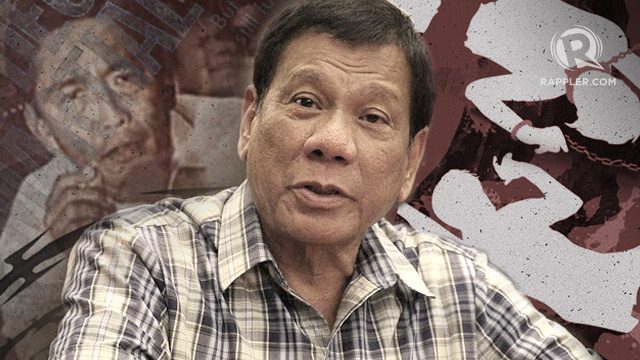SUMMARY
This is AI generated summarization, which may have errors. For context, always refer to the full article.

The specter of martial law looms again.
Rodrigo Duterte, a mere month into his presidency, mouthed the dreaded phrase in a pique this week, after the chief justice had reminded him of the democratic arrangement in which each of the 3 branches of government is left to its own role and powers – his (the executive), hers (the judiciary), and the legislature.
Obviously, the chief justice concerned herself more with the relationship between the first two branches. She was reacting to a public announcement by the president naming some judges among a hundred-fifty public servants as being involved in drugs without, for the moment in any case, the flimsiest evidence to show.
Obviously resenting what he took to be a suggestion that he had crossed the line – if not altogether flouted the rule of law, an accusation actually laid thick on him from everywhere for his anti-drug pogrom – the president asked if the chief justice had rather that he declared martial law.
The warning has been dismissed widely as mere froth, particularly in Congress, but, only predictably, given its all-too-obvious tendency to play ball with the new regime. Not at all surprising: it’s happened before – the threat, its dismissal, and its shocking fulfillment. It’s history repeating itself for its unlearned lessons, and, as is the run of such cases, with a vengeance.
Similarly the first time around, martial law could not have come unexpected, although until it actually came down on September 21, 1972 some of those who had been warning of it had been themselves rationalizing and wishing it away. At National Press Club carousing, this wishful thinking was given voice in the refrain, Marcos won’t dare, he only threatens.
Antonio Zumel, newspaper editor, president of the club himself, and secret high-placed communist, would have been expected to know better. On martial law night he had to bolt from his unfinished supper to elude his trackers, who came away from the club with nothing other than the wallet he had thrown away empty but for the identification cards and other contents too risky to carry in flight.

The classic sort of wishful thinker would be Senator Benigno Aquino Jr. – the sort who feels unable to do anything other than wish away what he thinks will happen because all rational reckoning leads to the conclusion that it will happen. In fact, only hours before he was arrested at the Manila Hilton, he had spoken his wish to an audience of teachers and graduate students at the Asian Institute of Management, across town in Makati.
Doubtless more incredulous was Senator Jose Diokno. Only the previous week, at the Press Foundation of Asia, he had remarked, “Marcos can create a throne of bayonets, but can he sit on them?” Diokno would be arrested on the first night of martial law, held in prison for two years, and put under house arrest for the next 12 – while Marcos sat on his prickly thrown.
In the same week Chino Roces, the publisher of the preeminent daily, The Manila Times, had had a visit from Ferdinand Marcos himself. A nephew-in-law of Chino’s who happened to be visiting too caught Marcos on his way out. He has recalled Chino telling him – and “sounding rather casual about it” – that Marcos had warned he was “close to declaring martial law.”
The threat in fact had been up in the air for some time, just looking for an excuse, and the wild-spreading street demonstrations tended to provide it.
Mouthing the very phrase publicly for the first time a mere few months into his second term, Marcos said he would declare “martial law… if it would redound to the upholding of our democratic institutions.” And he previewed it a week afterward with the arrest of a Manila college president, Nemesio Prudente, and a professor, Teodoro Lansang. The two were accused of inciting the demonstrators.
Marcos’s plot would not ripen until after two years. It was helped yet midway along by a grenade attack on an oppositionist rally for the midterm elections for which blame at first was laid on Marcos but more credibly later on the communists. The outrage occasioned a rehearsal of martial law at any rate; Marcos suspended the writ of habeas corpus, giving himself an excuse for warrantless arrests, among other forms of arbitrariness.
But when the real McCoy came, not the slightest rattling accompanied it. It was sensible only to its targets, and even so it was too late. The crackdown was so swift and quiet the nation slept through it. When it awakened, only somber music could be heard and only on government radio stations; the private ones issued only static, and television only a blizzard.
Even the hard-nosed and virtuously skeptical Teddy Benigno, Manila chief of the French news agency Agence France-Presse, had not stopped flogging himself decades later: “What suckers we all turned out to be!” – Rappler.com
The writer has himself adapted the following piece from a chapter (“A nation in denial”) in his book Chino and his times, a biography of Joaquin P. Roces.
Add a comment
How does this make you feel?
There are no comments yet. Add your comment to start the conversation.